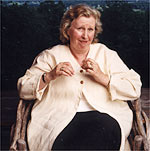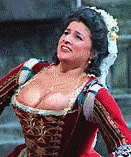|
What�s your opinion of Cecilia Bartoli? � Chickpea Fancier
Recently I saw a video of Renata Scotto in La Voix Humaine and I was stunned at how incredibly wonderful she was, to my eyes and ears simply perfect. Well, no. Better than perfect. She exceeded my dream of what that role can be. About halfway through the opera, the character sits near the phone, muttering, "Mon dieu, qu'il fait le redemande!" [My God, please let him call back!] over and over. And then the phone rang and Scotto froze in agony, unable to reach for the receiver because of her fear that the caller might not be the ex-lover. Now, I have to admit that this interpretation might not be everyone's cup of tea; certainly Scotto is rather rocky vocally, especially in the more sustained melodic lines. But she fulfilled what I wanted to hear in this part, and so I had to regard it as excellent. So I think that's my problem with Bartoli. How she does Susanna agrees with what at least some of the audiences wants to see and hear, which is fine. But I find this take illogical and cheap, so I can't really appreciate it. My feeling is that Susanna is the moral center of the opera, the character who defines the paradoxical connection between fidelity and reconciliation that is the most important dramatic theme of the work. As such, I want Susanna to be modest, intelligent, witty and charming, never vulgar. Yes, she loses her temper from time to time, and even panics once or twice. But we must remember that we are seeing her on the most stressful day of her life; no woman who ever lived could get through such a "folle journ�e" (which, let's keep in mind, is her wedding day!) without getting rattled. That, I think, is the musical/dramatic purpose of "Deh vieni non tardar": to show us who Susanna "really" is, every other day of her life: sweet, gentle, patient, kind, empathetic and wise, a perfect complement to hot-headed and none-too-bright Figaro. And that's where Bartoli dropped the ball: her Susanna is a crisis junkie, a flake who can never settle down. Many music-lovers have expressed their doubts that Miss Bartoli is really a mezzo; well, I want to go on record as saying I don't think she's a singer. Her erstwhile occasional mannerism of "talking" her music, and substituting tuned noises for the written notes, has now expanded to the point that very little that emerges from her mouth sounds like music. "Deh vieni" was an utter travesty, without a shred of legato, and low notes that sounded dubbed by Mercedes McCambridge. That legato is absolutely essential as a dramatic/musical symbol of the "real" Susanna we just talked about. Yes, on this horrible day she mostly has to communicate in chirpy recitative and patter, but the "real" Susanna sounds like "the murmuring brook and the gentle summer breeze," bel canto singing that is, despite the simple melody of "Deh vieni" is of course a real test of breath control, legato, phrasing and musical taste. Compare Bartoli's performance of this piece to
those of Elisabeth Schumann, Irmgard Seefried, Bidu Sayao, Hilde
Gueden, Anna Moffo, Mirella Freni, Lucia Popp -- or even the
much-maligned Kathleen Battle -- and you will hear Bartoli's
utter lack of vocal refinement or technical polish. Her singing
is, in a word, amateurish, like a musical comedy actress who has
never sung (or, for that matter, heard) the aria before.
Dear Dr. Repertoire, Speaking of Bartoli, have you read that book Cinderella and Company? And is Manuela Hoelterhoff skinny? Laura Immortelle Intrepid girl reporter Dawn Fatale infiltrated a Barnes and Noble booksigning session for this naughty behind-the-scenes tell-all, where Ms. Hoelterhoff (looking "Upper West Side pseudo-intellectual frumpy," says Dawn) kicked off the festivities by expressing her surprise at the big turnout "since my book was trashed on the Internet just last night." At that point poor dear Dawn started "retching violently" and thought it best to leave, but she did manage to nab a copy of C & Co. for me. I cannot join in the general rejoicing at Ms. Hoelterhoff�s "bitchily witty" or "wittily bitchy" or "brutally droll" (or whatever) opus. I will not call Ms. Hoelterhoff a "cunt" (I don�t even know the lady, so that would be presumptuous), but I certainly do think that the writing is cunty: smug, self-satisfied, angry, mean-spirited and without any sense of love or even respect for the art whose practicioners she so expertly eviscerates.  Now, Ms. Hoelterhoff is quite a celebrated stylist:
she can turn a phrase that would make Dorothy Parker proud, and
goodness knows she�s not afraid of anybody. But, like Ms.
Parker, the author seems incapable of connecting her cleverness
with any positive opinion. During her incumbency at the New
Yorker, Parker had to be assigned only those books and plays
to review that it looked likely she would hate. She
couldn�t� find any particularly entertaining way of
writing praise. And so the New Yorker tended to overlook a
lot of work with geniune worth in favor of trash that would
tickle Parker�s muse. I get that feeling when I read
Cinderella and Company: if the "backstage world of
opera" is truly populated with idiots, crooks and bastards,
why does Hoelterhoff hang around there in the first place? Now, Ms. Hoelterhoff is quite a celebrated stylist:
she can turn a phrase that would make Dorothy Parker proud, and
goodness knows she�s not afraid of anybody. But, like Ms.
Parker, the author seems incapable of connecting her cleverness
with any positive opinion. During her incumbency at the New
Yorker, Parker had to be assigned only those books and plays
to review that it looked likely she would hate. She
couldn�t� find any particularly entertaining way of
writing praise. And so the New Yorker tended to overlook a
lot of work with geniune worth in favor of trash that would
tickle Parker�s muse. I get that feeling when I read
Cinderella and Company: if the "backstage world of
opera" is truly populated with idiots, crooks and bastards,
why does Hoelterhoff hang around there in the first place?
Folks, this ain't a book: it's too short, with big type and wide margins. It's unconscionably padded with every hoary opera anecdote you've ever heard, soprano jokes, tenor jokes, shaggy-dog stories, insults for her pet target Kathleen Battle, and junk that Hoelterhoff apparently just cut-and-pasted off the internet into the manuscript. Every opera that comes up in conversation � even a bread-and-butter work like Boh�me -- is Hoelterhoff's cue for a paragraph or so of synopsis; every singer, conductor, manager or hanger-on who shows up in the story merits a mini-bio. Now, who is all this spoon-feeding for? Opera fans surely already have some vague idea who Rosa Ponselle is, and non-opera fans aren't likely to be reading a book that is nothing more than a bunch of opera professionals bitching about the lousy state of the music business. But, ah! each digression bringing Hoelterhoff 200 words closer to her goal! You see, there was no story in the book Hoelterhoff first said she would write. The concept was that she would follow Cecilia Bartoli around for a couple of years and wait for adorable and/or exciting things to happen. Well, that was the plan, anyway. First, Bartoli cancelled just about everything, and then she just showed up and sang what was left without ever doing anything interesting. Like, for example, she and her family take a daytrip to Disney World and Hoelterhoff tags along. They have a little lunch and eat a little ice cream, and the author complains that nothing dramatic happened. It seems Bartoli just isn't a drama queen. When her brother and collaborator suffered a series of operations for a brain tumor, Bartoli (admirably) snapped to her handlers, "This thing with Gabriele�it's not something the world needs to know. I don't want it dramatized into something very sentimental�" Incredibly, Hoelterhoff includes not only Gabriele's illness but Bartoli's complaint in the book. So much for bella figura. Even with such breaches of confidence, there's just not enough material here, so Hoelterhoff widens her net to, basically, everyone she knows, eliciting rapturous praise for Bartoli from personal manager Jack Mastroianni, impresarios Joe Volpe and David Gockley and various others who have huge stakes in the mezzo's success. More thoughtful (and far more entertaining) reflections on Bartoli and the operatic world she inhabits come from Hoelterhoff's two nominees for the title of "most hated man in the music business," Herbert Breslin and Matthew Epstein. Try as she might to depict Breslin as a lout (Hoeterhoff admits she still bears a grudge against him for blackballing her as Pavarotti's biographer), the author cannot distort some startling truths that tumble out of the mouth of the "bullet-headed, forever-tan egomaniac." "What is the future of the world of opera? I don't know. But today Mary Curtis-Verna would be worshipped as a goddess�.Bartoli can't sing Mimi, she can't sing Tosca or La traviata, and she can't sing Aida, Manon Lescaut, or Desdemona. There is not one major role she can sing�.She has made a career of singing two operas and twenty-four songs! �.Big, big, big things don't happen to little Despina!"Hoelterhoff asks Epstein (who shares the chapter "Queen of the Met" with Tebaldi) why so few singers stay the distance: "It's not always voice. It's emotional security, intelligence, chance. Careers are determined by so many factors. What I can contribute is keeping someone on the right trajectory. But I'm not a shrink of a marriage counselor. I've seen people's careers harmed by emotional difficulties, wrong repertoire choices and schedules that were too unchallenging and kept them from growing artistically. . . What is not often recognized is that ninety percent of career self-destruction is done by the artists themselves. They are willful. they get lonely. Some have terrible parents. And then, let's be honest about it, they sing to be loved by a lot of people. That's already a peculiar interaction. A lot of people get to the top and think they don't deserve to be there." Epstein also serves to remind the reader what
all this backstage brouhaha is really about: he is a fan, about
the only one glimpsed in this book. Hoelterhoff crashes his
reunion party for the Tebaldiani long enough to sneer at the
diva's admirers ("a weepy, noisy crowd of aging singers
and standees"), resolutely cold to the art, the performers,
the excitement. Her own memories of standee days are none too
convincing, eliciting from her only she stalest of clich�s:
"I was swept away into a world of mystery and poetry so
different from my everyday existence I could not bear to leave.
And I suppose I never did." Please! Supposedly the formative
experience of her life, and all Hoelterhoff can muster is a
Harlequin Romance clich� -- without an iota of the flair she
brings even to a throwaway gag about Riccardo Muti!
One glaring problem with the book, something Hoelterhoff�s editor really should have taken her to task for, is the incessant, obsessive carping on overweight, a diabtribe that should be called Slenderella and Company. Five times in the first four pages the author snipes at someone for being fat; the references continue at a rate of approximately once per page for the rest of the book. Now, I understand that when you�re writing about, say, Deborah Voigt , fat is an issue, and Hoelterhoff tells the diva's story about the stinging criticism she got from Georg Solti and her subsequent weight loss and partial "relapse." And of course excess weight impacts strongly on Pavarotti�s health and, therefore, on his reliability. But does that justify calling the tenor "The Fat Man" not once but a dozen times? Every time Jane Eaglen shows up in the book, Hoelterhoff tosses in some further size-specific adjective ("jolly, jumbo-sized") to remind us that the soprano is big. And some of it is just distasteful: "The bedsprings must have creaked somewhere on the West Side of Manhattan as Eaglen chortled into her pillows." Well, if you were there, and if the bedsprings did creak, that�s at least reportage. But Hoelterhoff wasn�t there; it�s just embroidery, and not very pretty embroidery at that. And when the soprano temporarily abandons her internet presence, Hoelterhoff muses, "One night I was watching The X-Files and encountered a fat-sucking vampire with very dry skin who befriended large women he met though on-line chat rooms. I thought of Jane Eaglen." Yes, she�s fat. We get it. We've seen the pictures. But what about the voice? What about the musicianship? What about her sense of dedication or her future plans or her reasons for becoming a singer in the first place? Sorry, such trivia are not allowed to impinge on the author's avoirdupois obsession. And who the hell cares about the figures of management, for God�s sake? What difference does Sally Billinghurst�s "fluffy plumpness" make to her velvet-glove management style at the Met? Do people resent Herbert Breslin�s chutzpah more because he is "pot-bellied?" Would the "portly" Matthew Epstein lose his "most-hated" status if he could drop a few pounds? (Given that Epstein has been HIV-positive for over a decade, perhaps he�s happy to be able to keep the weight on.) The author takes Albert Innaurato to dinner, where he voices fears about Bartoli turning into a sort of operatic Neely O'Hara, but Hoelterhoff's not listening: she's too busy scanning the menu for a low-fat entree. Here and there we get revealing, sometimes surprising glimpses of opera stars we thought we already knew. Ren�e Fleming is surprisingly witty and level-headed, and the Alagnas (whom the author takes great pains to despise) come off vulnerable and charming, if a little kooky. We also get a rare unflattering glimpse of the book's ostensible subject. Annoyed at her director during a Cenerentola run-through, Bartoli retires to her dressing room to sing and play the piano. When the stage manager informs the young diva that the rehearsal is resuming, she smiles, thanks him and doesn't move an inch. And so the dress rehearsal is completed with the leading lady absent, but only a few yards from the stage. Cute, one might say, even cunning. But how big a step is it from this sort of passive-aggressiveness to Gheorghiuesque wig-flinging? If Bartoli didn't always wear her own hair, we might have found out by now. Hoelterhoff does a little double-dipping toward the end of the book. The Met hires her to write the television commentary for the marathon James Levine gala; the script she delivers is too smartass for their taste, so they pay her off and go elsewhere for rewrite. In the meantime, Hoelterhoff repeats everything she hears at the production meetings, where presumably it did not occur to anyone to tell a Met contractee that their talk was off the record. Hoelterhoff works like a dog to make the Manuelaless gala sound like a disaster, but, as it turned out, it was a tolerable success with some glittering moments. And all Hoelterhoff's sour-grapes grumbling can't change anyone's mind about that. Cinderella and Company is apparently selling pretty well; perhaps even well enough to lead Knopf to ask Hoelterhoff for a sequel. The only problem is, after everyone in the business has read this collection of hatchet-jobs, who will be so foolish as to talk to her? |

 You mean the Cecilia Bartoli of a few years
ago who put her smallish voice, winning girl-next-door
personality and superstar presence to the service of a series of
excellent revivals of La Cenerentola? Or are we talking
about the Bartoli of today, who plays Susanna as a tough,
loudmouthed guttersnipe, swinging her massive bazooms hither and yon as she
galumphs across the Met's stage?. Who can forget the
grotesque sight of Bartoli slamming down her high heel on
Terfel's crotch, then grabbing and twisting his leg (a move
she learned from Jane Eaglen?), the meanwhile cackling and
snorting and grunting like a whole barnyard?Now, there are plenty
of different ways to play Susanna, and I am the first to agree
with Uta Hagen or Stella Adler or whoever the hell it was who
said, "Even a bad acting choice is better than no choice at
all." Certainly any artist who takes a strongly personal
approach to a role is going to be controversial. That approach is
going to be a dream come true for some listeners; a nightmare for
others, depending on how it coincides with their various
preconceptions about the role.
You mean the Cecilia Bartoli of a few years
ago who put her smallish voice, winning girl-next-door
personality and superstar presence to the service of a series of
excellent revivals of La Cenerentola? Or are we talking
about the Bartoli of today, who plays Susanna as a tough,
loudmouthed guttersnipe, swinging her massive bazooms hither and yon as she
galumphs across the Met's stage?. Who can forget the
grotesque sight of Bartoli slamming down her high heel on
Terfel's crotch, then grabbing and twisting his leg (a move
she learned from Jane Eaglen?), the meanwhile cackling and
snorting and grunting like a whole barnyard?Now, there are plenty
of different ways to play Susanna, and I am the first to agree
with Uta Hagen or Stella Adler or whoever the hell it was who
said, "Even a bad acting choice is better than no choice at
all." Certainly any artist who takes a strongly personal
approach to a role is going to be controversial. That approach is
going to be a dream come true for some listeners; a nightmare for
others, depending on how it coincides with their various
preconceptions about the role.